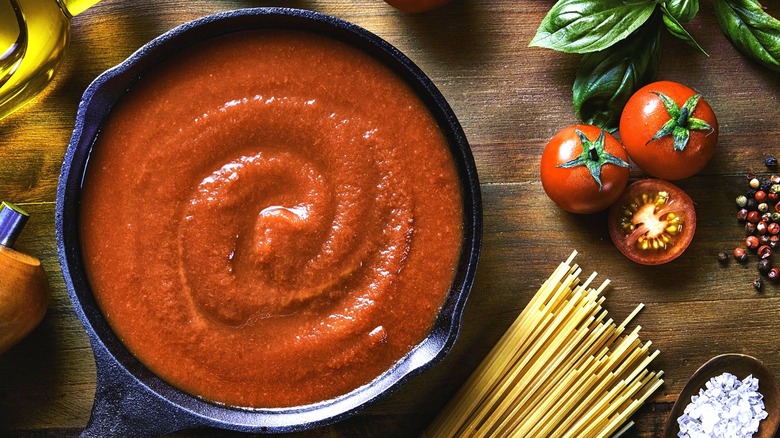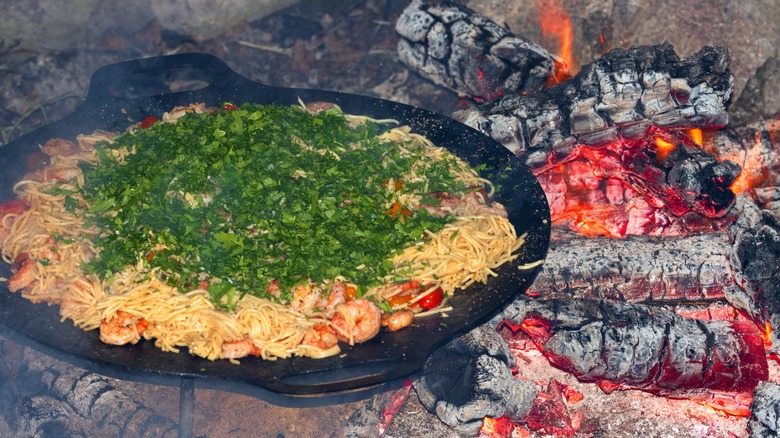Dehydrated Pasta Sauce Lets You Bring A Taste Of Home When Camping
When outdoor adventurers plan their off-grid meals, pasta is usually absent from the menu. But by dehydrating your own sauce before your trip, you can bring a hearty home-cooked meal with you, even when every ounce counts. Start with your favorite pasta sauce, preferably homemade. Store-bought pasta sauce brands are often too watery and contain high-fructose corn syrup, which can interfere with drying, so if you go this route, look for a thicker sauce and check the ingredients.
Divide your sauce into meal-sized portions and spread each one onto a parchment-lined baking sheet in layers ¼-inch thick or less. Then, pop your baking sheets into the oven and turn it on as low as it will go — usually 150 to 170 degrees Fahrenheit. Leave the door cracked so that evaporated moisture can escape. After a few hours, when the top of your sauce is set and has a leathery texture, flip it over and put it back in the oven to finish drying. As a bonus, you can dehydrate whole tomatoes in the oven, too.
The total drying time will be around six to 12 hours, depending on the thickness of the layers and the moisture content of the sauce. If you have a food dehydrator, you can use that instead — just be sure to line the dehydrator trays with parchment paper or silicone mesh sheets to keep the sauce from falling through. Once dry, pulverize your sauce sheets into a powder using a food processor or blender and vacuum-seal or store them in an airtight container. When you're ready to eat, simply rehydrate the powder with boiling water and serve it with cooked pasta.
Tips for making the tastiest dehydrated pasta sauce
If you're working with homemade sauce, simmer it a while longer than usual when cooking to reduce as much liquid as possible before dehydrating it. This will help your sauce dry faster. Also, some sauces dehydrate better than others. Avoid types of pasta sauce with dairy, as the slow dehydration process allows bacteria to proliferate before the sauce fully dries, which can lead to food poisoning. Skip the oil-based sauces as well, since fat doesn't dehydrate and can go rancid quickly, and use as little oil as possible when preparing homemade sauces for dehydration.
For meat sauces, start with lean meat and break it up into small, evenly-sized pieces while browning. Drain it thoroughly and rinse with water to remove as much fat as possible before adding it to the pasta sauce. You can add cooked pasta to the sauce before dehydrating for a super easy campsite meal or boil uncooked pasta and top it with the rehydrated sauce. If you boil your pasta at the campsite, don't throw out the water!
Instead, use the pasta water in your sauce to rehydrate it. This saves water (a precious resource, especially off the grid) and the starch from the pasta will improve the texture of the sauce. Weigh your sauce portions in grams, once before dehydrating and once after. Then, subtract the dry weight from the wet weight to find how much water to add to rehydrate your sauce — 1 gram equals 1 milliliter.

